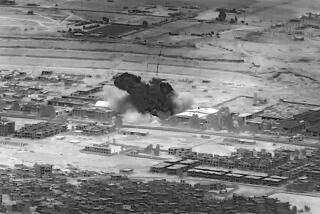Seeking a ‘Cyberwar’ Defense
- Share via
The Pentagon has long been a favored target of computer hackers, almost an addiction. Congressional researchers put the hack attempts at about 250,000 a year. That works out to 685 unauthorized bids for access every day, nearly one every two minutes.
So when Deputy Defense Secretary John Hamre announced Thursday that during the past two weeks the Pentagon’s computers suffered “the most organized and systematic attack” ever, it was way past time to sound the alarm.
The Defense Department already spends $1.6 billion annually on computer security. One can rightly question how well that money is being spent. A panel of outside experts, the Defense Science Board, is clamoring for a sharp increase in spending on computer security to prevent what some describe as the electronic equivalent of Pearl Harbor. In other words, an unexpected and sustained attack on such infrastructures as power grids, air traffic control and other key operations.
But who is the enemy? Hamre said that the Pentagon intrusions had “all the workings of a game,” driven more by “voyeurism or vandalism” than menace. The assault appeared typical of previous Defense Department problems, in which the military insisted that computer networks with classified and sensitive information were not breached.
Something surely is driving federal uneasiness. Perhaps it’s the fact that the U.S. government has been conducting “infowar” or “cyberwar” games since at least 1995, testing its own defenses. Apparently the results have been less than reassuring.
According to the publication Defense Daily, these concerns may have prompted an unprecedented effort by the Defense Department to share its security concerns with the private sector, which plays a huge role in running much of the nation’s electronic infrastructure.
In the infowar scenarios, an air traffic control system blinks out, American spy satellites over the Middle East go haywire, Wall Street computers crash. Days pass before it can be determined that these are coordinated attacks, not electronic bungling by federal agencies. The scenarios have shown that it would be difficult to trace the origin of the attack. Clearly the situation calls for more study on solutions before more piles of money are spent.
For most Americans, this kind of crisis exists only in the minds of Hollywood movie producers. The public deserves to know more about these supposed threats than it has been told to date.






